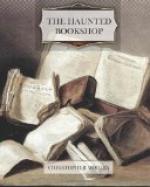My dear Andrew:
It is scandalous not to have thanked you sooner for the annual cask of cider, which has given us even more than the customary pleasure. This has been an autumn when I have been hard put to it to keep up with my own thoughts, and I’ve written no letters at all. Like everyone else I am thinking constantly of this new peace that has marvellously come upon us. I trust we may have statesmen who will be able to turn it to the benefit of humanity. I wish there could be an international peace conference of booksellers, for (you will smile at this) my own conviction is that the future happiness of the world depends in no small measure on them and on the librarians. I wonder what a German bookseller is like?
I’ve been reading The Education of Henry Adams and wish he might have lived long enough to give us his thoughts on the War. I fear it would have bowled him over. He thought that this is not a world “that sensitive and timid natures can regard without a shudder.” What would he have said of the four-year shambles we have watched with sickened hearts?
You remember my favourite poem—old George Herbert’s Church Porch— where he says—
By all means use sometimes
to be alone;
Salute
thyself; see what thy soul doth wear;
Dare to look in thy
chest, for ’tis thine own,
And
tumble up and down what thou find’st there—
Well, I’ve been tumbling my thoughts up and down a good deal. Melancholy, I suppose, is the curse of the thinking classes; but I confess my soul wears a great uneasiness these days! The sudden and amazing turnover in human affairs, dramatic beyond anything in history, already seems to be taken as a matter of course. My great fear is that humanity will forget the atrocious sufferings of the war, which have never been told. I am hoping and praying that men like Philip Gibbs may tell us what they really saw.
You will not agree with me on what I am about to say, for I know you as a stubborn Republican; but I thank fortune that Wilson is going to the Peace Conference. I’ve been mulling over one of my favourite books— it lies beside me as I write—Cromwell’s Letters and Speeches, edited by Carlyle, with what Carlyle amusingly calls “Elucidations.” (Carlyle is not very good at “elucidating” anything!) I have heard somewhere or other that this is one of Wilson’s favourite books, and indeed, there is much of the Cromwell in him. With what a grim, covenanting zeal he took up the sword when at last it was forced into his hand! And I have been thinking that what he will say to the Peace Conference will smack strongly of what old Oliver used to say to Parliament in 1657 and 1658—“If we will have Peace without a worm in it, lay we foundations of Justice and Righteousness.” What makes Wilson so irritating to the unthoughtful is that he operates exclusively upon reason, not upon passion. He contradicts Kipling’s famous lines, which apply to most men—




